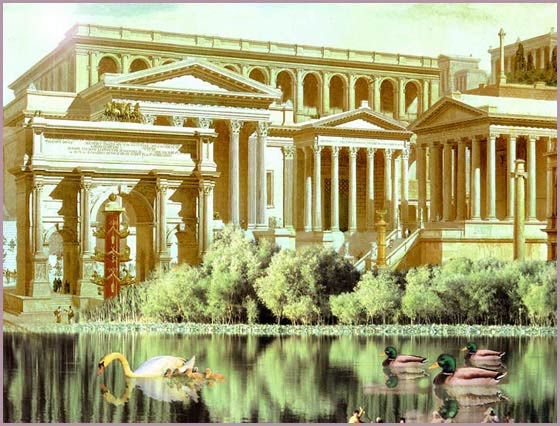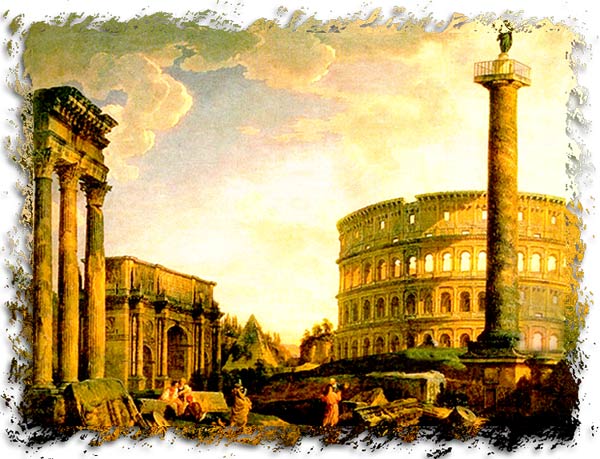That is how We make the Signs clear so that, hopefully, they will return. (Surat al-A'raf: 174)
Why Might the Christians Have Made This Groundless Claim?
Trinitarianism has been the cause of considerable debate from the time of its appearance right up to the present day. In fact, these arguments have spread to ever wider areas since the eighteenth century. Biblical researchers of that time first asked why belief in the trinity was not openly expressed in the Gospels, and then questioned under what conditions it appeared. Today, many theologians, scientists, researchers, writers, and independent Christian movements reject many traditional beliefs, particularly the trinity and the belief in the atonement for sins. Some of them, examples of which we shall consider in due course, adopt an Arianist understanding instead of trinitarian belief based upon the Bible and research into surviving works by the earliest Christians.
Following the decisions taken at the Councils of Nicaea (325) and Chalcedon (451), belief in the trinity became Christianity's foundation stone, and refusal to accept it made one a heretic. Those who said that such an idea contradicted faith in a monotheistic God, who maintained that the trinity did not appear in the Gospels or who had reservations on the subject, were either silenced or pressured into acceptance. In his Articles of the Apostolic Creed, Theodore Zahn says that "the article of faith up until about 250 AD was, 'I believe in God, the Almighty'. Between 180 and 210 AD the word 'Father' was added 'the Almighty'. This was bitterly contested by a number of the leaders of the Church … since they regarded it an unthinkable sacrilege to add or subtract any word to the Scriptures."45
Duncan Heaster, known for his Biblical research, set out his views in a debate on the trinity in 1988:
I would suggest to you that the Trinity is a conception of God which is impossible to understand and which completely contradicts the clear teaching of the word of God. Can you understand a God who is one and yet three and three and yet one? Can you conceive of a son who existed before he was born? A son who is as old as his father? I suggest that the doctrine of the Trinity finds no place at all in the Word of God. There is no mention of the word trinity in the Bible, and it was introduced into Christianity, as most of us here will be aware, in the 3rd century A.D. … The word "God" occurs about 1,300 times in the New Testament, and in not one of those passages where the word "God" occurs is there any suggestion of a plurality of persons in the Godhead... But that God, I submit, is unknown to the pages of the Scriptures."46
Heaster's words are unequivocal, and many other scholars today express the same views. John Hick, for example, author of The Rainbow of Faiths, reaches the following conclusion: (Surely God is beyond all the expressions in the following summary):
1. When we look at the research carried out in recent years, we see that Prophet Jesus did not teach that he was God, or the Son of God, the second element in the Trinity. In complete contrast to that belief, he always taught that he was the son of Man.
2. Christian authorities and theologians are unable to expound the traditional Christian belief that Prophet Jesus is both fully God and also fully human in a comprehensible manner.
3. Belief in incarnation does irreparable harm to Christians' relations with other religious traditions and their adherents. That is because this belief implies that Christianity is superior to other religions.47
One matter needs to be clarified here. This book does not seek to judge either those people who first proposed this belief or those sincere Christians who adhere to it, but to reveal the truth about trinitarian belief according to the Qur'an and to explain how it came to be produced and adopted. It must not be forgotten that true Muslims believe in all of the prophets and books sent by God, and respect Christians beliefs and values. Muslims feel great affection for all Christians who sincerely believe in God, fear and respect Him, are sincerely devoted to Him, and who respect His messenger, Prophet Jesus (pbuh), and approach such Christians in a spirit of friendship and tolerance.
There may be people who propagate belief in the trinity with secret designs of their own, who look to only their own interests. In much the same way, others of sincere intent may possibly have moved away from the true path gradually, without being aware of it. The belief in question, originally expressed in a different form, may have become distorted over time. Communities of individuals who supported beliefs similar to the trinity and played a role in its becoming accepted must have held very different ideas from one another. Some may well have supported such claims, with the aim of emphasizing the superior moral values of Prophet Jesus (pbuh), while others may have misinterpreted metaphorical expressions. Still others, influenced by the prevailing political and cultural conditions of the time, may have wanted to ensure a more rapid spread of Christianity. In rejecting the trinity, therefore, we need to bear in mind the possibility that the first Christians may have fallen into error through being influenced by the historical, political, and cultural conditions of their time, or else may have been adversely affected by the persecution and oppression to which they were subjected. The probable reasons for the claim about the trinity being put forward are revealed in this chapter. (Surely God is beyond all the superstitious expressions employed in this chapter to describe Christians' mistaken beliefs. We once again state that Prophet Jesus [pbuh] has nothing to do with such ascriptions.)
The word "son" in the New Testament was not used to support the Trinity
At the heart of the belief in the trinity lies the erroneous belief that Prophet Jesus (pbuh) is the son of God. (Surely God is beyond that!) However, when one examines how and why son was used when Christianity was born and in earlier periods, a very different picture emerges.
Son is used to refer to Prophet Jesus (pbuh) in four very different ways in the New Testament: the son of Mary, the son of David, the son of man, and the son of God.
The term son of Mary refers to the fact that Prophet Jesus (pbuh) was physically born through by Mary, and the son of David denotes his lineage.
The term the son of man is of enormous importance, both from the point of view of how he described himself and how those around him regarded him. In fact, this term appears more frequently in the New Testament than the Messiah and the son of God. The term the son of man is unique to Jewish theology and is used far more in the Old Testament, particularly in the Book of Psalms. It refers directly to human beings and is a very familiar expression. For instance, it is used 90 times in reference to Prophet Ezekiel (pbuh), who is certainly depicted as a mortal human being.

The Aramaic equivalent of this term, bar nash(a), was used for everyone also at the time of Prophet Jesus (pbuh). However, the New Testament term the son of man is not used for everyone, as in Judaic scriptures, but is employed many times to refer to Prophet Jesus (pbuh).48The term the son of man is used 69 times in Matthew, Mark, and Luke, and 13 times in John. In only one place it is used for humanity in general (Hebrews, 2:6-8). The description is used several times both regarding and by Prophet Jesus (pbuh), in the sense of I. Some of these passages are as follows:
And they were all amazed at the greatness of God. While everyone was marveling at all that Jesus did, he said to his disciples: "Listen carefully to what I am about to tell you: The Son of Man is going to be betrayed into the hands of men." (Luke, 9:43-44)
For as Jonah was a sign to the Ninevites, so also will the Son of Man be to this generation. (Luke, 11:30)
We are going up to Jerusalem, and everything that is written by the prophets about the Son of Man will be fulfilled. He will be handed over to the Gentiles. (Luke, 18:31-32)
While he [Jesus] was still speaking a crowd came up, and the man who was called Judas, one of the Twelve, was leading them. He approached Jesus to kiss him, but Jesus asked him: "Judas, are you betraying the Son of Man with a kiss?" (Luke, 22:47-48)
As stated above, the term the son of man was used by the first Christians in the sense of human being, for most of the first Christians were Jewish and had always used this term in that sense. Its use in the Old Testament supports that view and reveals that Prophet Jesus (pbuh) was a human being created by God and in need of His mercy.
The New Testament's expression the son of God constitutes one of the so-called foundations of trinitarianism. This interpretation has led to centuries of debate in the Christian world, however. In fact, every researcher familiar with Jewish culture and language at that time has stated that the expression is metaphorical. The widespread view is this: The son of God was a metaphorical term already in wide use in Jewish society and frequently used to refer to important individuals.
In 1977, seven biblical experts including Anglican theologians published The Myth of God Incarnate, which provoked considerable interest. In the foreword, editor John Hick, wrote:
The authors of this book are agreed on the need for a major religious development to take place in this final period of the 20th century. This need stems primarily from an increase in information concerning the origins of Christianity. Moreover, it depends on the acceptance of Prophet Jesus as a human being sent by God with a special duty and for a holy purpose. And it is based on accepting that the belief that Prophet Jesus was the incarnation of God and that he is the second element in the Trinity is a poetic and mythological expression of what Prophet Jesus means to us.49
Throughout the book, Hick concentrates on the fact that the term the son of God is a belief put forward after Prophet Jesus' (pbuh) death, one that he never communicated himself.50
Jesus did not make the claim to deity that later Christian thought was to make for him… [I]t is extremely unlikely that the historical Jesus thought of himself in any such way. Indeed he would probably have rejected the idea as blasphemous; one of the sayings attributed to him is, 'Why do you call me good? No one is good but God alone' (Mark, 10.18). Of course no statements about what Jesus did or did not say or think can be made with certainty. But such evidence as there is has led the historians of the period to conclude, with an impressive degree of unanimity, that Jesus did not claim to be God incarnate.51
Among the Jews of that time, the son of God had the metaphorical meaning of belonging to God. Someone referred to in this way was considered close to God, one who served Him with all his heart, and who lived the kind of life that would be pleasing to Him. It never meant that the person in question possessed attributes resembling or equivalent to His, or implied any divine status. (Surely God is beyond that!) Indeed, there was no room for such a belief in Judaism.
Therefore, the first Christians may have used this term to express their respect for Prophet Jesus (pbuh) and their belief that he was His servant and close to God. In fact, many Christian theologians say that the term the son of God was given to him by his followers to honor and praise him. Moreover, they stress that it is a metaphor.
The title son was a particular form of expression in Hebrew and was used, together with other concepts, to indicate that he had a particularly close relationship to something. According to The Catholic Encyclopedia:
The word "son" was employed among the Semites to signify not only filiation, but other close connexion or inmate relationship. Thus, "a son of strength" was a hero, a warrior, "son of wickedness" a wicked man, "sons of pride" wild beasts, "son of possession" a possessor, "son of pledging" a hostage, "son of lightning" a swift bird, "son of dead" one doomed to death, "son of a bow" an arrow, "son of Belial" a wicked man, "son of prophets" disciples of prophets etc. The title "son of God" was applied in the Old Testament to persons having any special relationship with God. Angels, just and pious men, were called "sons of God"..52
Dr. Mahmut Aydn of the 19 Mays University Theology Faculty in Turkey reports John Hicks' views on this subject in these terms:
This expression was already very widespread at the time of Prophet Jesus (pbuh) and was frequently used for important individuals. Therefore, his disciples adopted the son of God and used it to describe their leader: Prophet Jesus (pbuh). Accordingly, Prophet Jesus (pbuh) was described as the son of God, just like the kings from the line of David and persons of religious and moral importance living in Jewish society. According to Hick, in Jewish thought those kings and important people who were awarded this title were never literally regarded as being God's son. Rather, they were honored by being regarded as such, and were revered and praised, solely on account of their personal characteristics. In other words, the title in question was never used in a literal sense in Jewish thought. The term son of God was used for people throughout Jewish history. The Messiah, for example, was regarded as an earthly king who would have to be descended from the line of Prophet David, regarded as the son of God… The followers of Prophet Jesus (pbuh) were able to adapt this term to him very easily. The way that Prophet Jesus (pbuh) was seen as an entity with divine attributes is first of all the result of the culture in which he lived. Accordingly, at the time of Prophet Jesus (pbuh), certain individuals with important characteristics were known as the son of God in the symbolic sense."53
After considering Hick's views in some detail, Aydn says this about the use of the term the son of God:
Neither Prophet Jesus (pbuh) himself ever suggested that he was divine, nor did the disciples ever ascribe to him any form of divinity or god-likeness. On the contrary, the idea of his divinity was put forward inside the first Christian community and gradually developed, assuming the nature of doctrine and dogma. That is because expressions regarding the divine sonship gradually left the Jewish context and entered that of Hellenistic Roman culture.54
P. M. Casey, a New Testament scholar and author of several books on the origins of early Christianity, says: "… Jesus could have been called a son of God by anyone who thought that he was a particularly righteous person."55He also draws attention to how, within the Jewish tradition, important individuals and events were referred to by mythological and metaphorical expressions, either individually or socially.56
 |
According to the concept of the Messiah in Jewish belief, the Messiah, a king, would be descended from the line of Prophet David (pbuh). The kings descended from that line were regarded as "the sons of God in the sense of being appointed to the rank of kingship…"57Those who believed in Prophet Jesus (pbuh) as the Messiah may have seen nothing improper in referring to him by that term as an extension of this belief.
In The Historical Figure of Jesus, Sanders also notes that the Jews never understood the son of God in the literal sense. According to him, they used the term the sons of God in a metaphorical sense for both men and women and as a symbolic statement of one's devotion to God.58Sanders interprets the son of God by the first Christians in the following way:
The early Christians, used "Son of God" of Jesus, but they did not think that he was a hybrid, half God, and half human. They regarded "Son of God" as a high designation … The first followers of Jesus, however, when they started calling him "Son of God," would have meant something much vaguer: a person standing in a special relationship to God, who chose him to accomplish a task of great importance. When Gentile converts started entering the new movement, they may have understood the title in light of the stories about Alexander the Great, or of their own mythology.59
As Sanders states, when Prophet Jesus' (pbuh) words and deeds passed from the Jews to the Gentiles, at that time the pagan world, this metaphorical expression began to acquire a new meaning and to be used to refer to his alleged divine status. In this way, by being regarded as the Messiah by the first Christians and as having a fully human identity, he gradually became divine. (Surely God is beyond that!) William C. Varner examines how the first Christians perceived this term:
It is also true that the New Testament calls each one who believes in Jesus a "son of God." (John, 1:12) How then does Jesus being the son of God differ from my being a son of God? Does the title son of God clearly express Jesus' deity, or do Christians read more into it than the Bible intends? The only way to answer these questions is to comprehend how the first hearers and readers of the Christian message understood the title when they encountered it. Who were those first hearers/readers? On the most basic level, some were Gentiles and others were Jews. Both already had the expression son of God in their first-century linguistic and cultural backgrounds.60
Proponents of the trinity do not accept the interpretation that the concept of the son of God in the New Testament is an expression of honor and respect, even though many New Testament statements clearly use it in that very sense. For example, the sons of God is used for all who have faith in God and follow Prophet Jesus' (pbuh) path:
But I tell you: Love your enemies and pray for those who persecute you, that you may be sons of your Lord in heaven. He causes His Sun to rise on the evil and the good, and sends rain on the righteous and the unrighteous. If you love those who love you, what reward will you get? Are not even the tax collectors [of the Romans] doing that? And if you greet only your brothers, what are you doing more than others? Do not even pagans do that? Be perfect, therefore, as your heavenly Lord is perfect. (Matthew, 5:44-48)
… those who are led by the Spirit of God are sons of God. (Romans, 8:14)
I will be God to you, and you will be my sons and daughters, says the Lord Almighty. (2 Corinthians, 6:18)
Your reward will be great, and you will be sons of the Most High, because he is kind to the ungrateful and wicked. (Luke, 6:35)
As is apparent from the examples above, the term "the sons of God" is used in many passages in the New Testament. Clearly, the meaning is the same as that in which it is used in Jewish culture in general: people who have taken God as their friend, who endeavor to draw close to Him, and who live by His laws. Indeed, Luke's Gospel mentions Prophet Adam (pbuh) as the son of God (Luke 3:38). The term the son of God is also used many times in the Old Testament. For example, son is used for the Israelite people in the Old Testament:
In another extract from the Old Testament the same expression is used to describe angels:
At the beginning of the Book of Exodus, Chapter 6, the term the sons of God is employed to describe humans multiplying on the face of the Earth. Other passages along these lines read: (Surely God is beyond all the expressions that follow!)
Then say to Pharaoh: "This is what the LORD says:' 'Israel is my firstborn son.'" (Exodus, 4:22)
They will come with weeping; they will pray as I bring them back. I will lead them beside streams of water on a level path where they will not stumble, because I am Israel's Lord, and Ephraim is my firstborn son. (Jeremiah, 31:9)
I will proclaim the decree of the LORD: He said to me [David], "You are My Son; today I have become your Lord." (Psalm, 2:7)
The term son of God is also used to refer to Prophet Solomon (pbuh) in the Old Testament. The relevant passage reads:
When your days are over and you go to be with your fathers, I will raise up your offspring to succeed you, one of your own sons [Solomon], and I will establish his kingdom. He is the one who will build a house for Me, and I will establish his throne forever. I will be his Lord, and he will be My son. I will never take My love away from him, as I took it away from your predecessor. I will set him over My house and My kingdom forever; his throne will be established forever. (1 Chronicles, 17:11-14)
This holy individual referred to by the title "son of God" is the Prophet Solomon (pbuh), one of the sons of Prophet David (pbuh).
[David said to Solomon, "God said to me:] But you will have a son who will be a man of peace and rest, and I will give him rest from all his enemies on every side. His name will be Solomon, [1] and I will grant Israel peace and quiet during his reign. He is the one who will build a house for My Name. He will be My son, and I will be his Lord. And I will establish the throne of his kingdom over Israel forever. Now, my son, the LORD be with you, and may you have success and build the house of the LORD your God, as He said you would." (1 Chronicles, 22:9-11)
The same chapter continues:
Of all my sons—and the LORD has given me many—he has chosen my son Solomon to sit on the throne of the kingdom of the LORD over Israel. He said to me: "Solomon your son is the one who will build my house and my courts, for I have chosen him to be My son, and I will be his Lord. I will establish his kingdom forever if he is unswerving in carrying out My commands and laws, as is being done at this time." (1 Chronicles, 28:5-7)
 All of the above statements make it clear that in the Jewish tradition, the son of God was used to refer to people who took God as their friend, who were sincere and devout. This is why it was used to refer to Prophet Jesus (pbuh). Just as in the cases of Prophet Adam (pbuh) and Prophet Solomon (pbuh), it is a metaphorical term that stems from Jewish traditions. It was chosen by the first Christians, who were Jewish and who knew the Torah and lived by the Mosaic Law until becoming followers of Prophet Jesus (pbuh), to express Prophet Jesus' (pbuh) respect, devotion, and closeness to God.
All of the above statements make it clear that in the Jewish tradition, the son of God was used to refer to people who took God as their friend, who were sincere and devout. This is why it was used to refer to Prophet Jesus (pbuh). Just as in the cases of Prophet Adam (pbuh) and Prophet Solomon (pbuh), it is a metaphorical term that stems from Jewish traditions. It was chosen by the first Christians, who were Jewish and who knew the Torah and lived by the Mosaic Law until becoming followers of Prophet Jesus (pbuh), to express Prophet Jesus' (pbuh) respect, devotion, and closeness to God.
Another piece of evidence showing that the term the son of God provides no basis for belief in the trinity concerns the use of the name of God in the New Testament. In his paper "Who is Jesus? Do the creeds tell us the truth about him?" Anthony Buzzard writes:
Thousands upon thousands of times in the Bible (someone has calculated over 11,000 times), God is described by personal pronouns in the singular (I, me, you, He, Him). These pronouns in all languages describe single persons, not three persons. There are thus thousands of verses which tell us that the "only true God" is One Person, not three. There is no place in the New Testament where the word "God" can be proved to mean "God-in-Three-Persons." The word God, therefore, in the Bible never means the Trinitarian God. This would immediately suggest that the Trinitarian God is foreign to the Bi.61
As we have emphasized throughout this chapter, the term son was widely employed in Jewish culture and bore no divine significance. Therefore, those who use it in the belief that Prophet Jesus (pbuh) was literally the son of God, who claim that he has powers equal to God's (Surely God is beyond that!), are making a serious mistake in terms of Jewish belief. The Qur'an warns people several times not to use this term to ascribe divine status to Prophet Jesus (pbuh). This is a grave sin in the sight of God. For example:

The use of Father in the New Testament
One common New Testament term used by Christian theologians who defend belief in the trinity is father. (Surely God is beyond all the expressions used in this chapter to reflect the Christians' erroneous beliefs.) But, in fact, like the term son, this word also has a metaphorical significance. In addition, it appears that the word is not only used by Prophet Jesus (pbuh), but by all people of sincere faith who fear and respect God, and pray to Him for help. The word father refers to the fact that God is these people's only Lord, friend, and parent, and thus does not support belief in the trinity.
 That is becouse those who do not belive follow falsehood, whereas those who believe follow the truth from their Lord. In that way God makes comparisons for humanity. (Surah Muhammad: 3) |
Some of the ways in which this word is used are as follow: (Surely God is beyond all these expressions)
The Father is greater than I. (John 14:28)
… that you may be sons of your Father in heaven. He causes His sun to rise on the evil and the good, and sends rain on the righteous and the unrighteous. (Matthew 5:45)
Go, instead, to my brothers and tell them: "I am returning to my Father and your Father, to my God and your God." (John 20:17)
Then the righteous will shine like the Sun in the kingdom of their Father. (Matthew 13:43)
But when you pray, go into your room, close the door, and pray to your Father, Who is unseen. Then your Father, Who sees what is done in secret, will reward you. (Matthew 6:6)
Your Father knows what you need before you ask him. (Matthew 6:8)
Your heavenly Father knows that you need them. But seek first His kingdom and His righteousness, and all these things will be given to you as well. (Matthew 6:32-33)
In the same way, let your light shine before men, that they may see your good deeds and praise your Father in heaven. (Matthew 5:16)
Be careful not to do your acts of righteousness before men, to be seen by them. If you do, you will have no reward from your Father in heaven. (Matthew 6:1)
This, then, is how you should pray: "Our Father, Who is in heaven, hallowed be your name." (Matthew 6:9)
For if you forgive people when they sin against you, your heavenly Father will also forgive you. (Matthew 6:14)
Be merciful, just as your Father is merciful. (Luke 6:36)
Clearly, the authors of the New Testament use Father to refer to the essence of God. It is no more than a sign of respect that applies to all people, rather than giving one particular person divine status. The term does not merely express a special bond between God and Prophet Jesus (pbuh), but is addressed to everyone who has submitted to God and lives the kind of life that meets with His approval. Indeed, even today many Christians begin their prayers with Our Father. Similar prayers of Prophet Jesus (pbuh), recorded in the New Testament, should not be interpreted any differently. Once again, we need to emphasize that these statements do not eliminate the errors of those who use the term Father to ascribe divine status to Prophet Jesus (pbuh). They are committing a grave sin in the sight of God, and verses of the Qur'an describe their situation as follows:
Our Lord's infinite might and power, and the fact that He is unsullied by any imperfection, are clearly emphasized in the Bible. John Hick sets this out in an interview:
Classic Christian theology developed a long time after the death of Prophet Jesus. Contemporary historical criticism of the New Testament seeks to enlighten us as to which of the words ascribed to Prophet Jesus in the New Testament texts in our possession may really have been spoken by him … It is impossible to interpret the term "Father" (in the Gospels) literally. The expression "the son of God" appears many times in the Old Testament. For example, Adam is the son of God; the angels are the sons of God; the kings of Israel are the sons of God and the nation of Israel, as a whole, is also the son of God. Clearly the concept of "Father" and "Son" in these expressions does not express a literal relationship, but symbolizes only a metaphorical expression of God-human relationship. Let us immediately add that seeking to interpret these expressions literally is considered a major sin in Judaism. Metaphorical expressions of this kind were, in any case, in existence in the time of Prophet Jesus. The metaphorical description of any human being as the "son of God" dedicated to any deity can be regarded as a part of the general religious symbolism at that time. In short, the expression "son" is a symbolic reference to closeness to God. As far as I know, it is the literal interpretation of this term that disturbs Muslims. Similarly, I must say that as a Christian I, too, will feel uneasy at such a literal interpretation.62
 Know then that there is no deity except God. (Surah Muhammad: 19) He is God there is no deity but Him. He is the Knower of the Unseen and the Visible. (Surat al-Hashr: 22) |
Many other New Testament passages need to be understood in a figurative sense, such as God's Children: (Surely God is beyond all the expressions in the extracts that follow.)
They are God's children, since they are children of the resurrection. (Luke 20:36)
Yet to all who received Him, to those who believed in His Name, He gave the right to become children of God. (John 1:12)
He did not say this on his own, but as high priest that year he prophesied that Jesus would die for the Jewish nation, and not only for that nation but also for the scattered children of God, to bring them together and make them one. (John 11:51-52)
The Spirit himself testifies with our spirit that we are God's children. Now if we are children, then we are heirs—heirs of God and co-heirs with the Messiah, if indeed we share in his sufferings in order that we may also share in his glory. (Romans 8:16-17)
The creation waits in eager expectation for the sons of God to be revealed. (Romans, 8:19)
Do everything without complaining or arguing, so that you may become blameless and pure, children of God without fault in a crooked and depraved generation, in which you shine like stars in the universe as you hold out the word of life. (Philippians 2:14-16)
How great is the love the Father has lavished on us, that we should be called children of God! And that is what we are! The reason the world does not know us is that it did not know Him. Dear friends, now we are children of God, and what we will be has not yet been made known. (John 3:1-2)
This is how we know who the children of God are and who the children of the devil are: Anyone who does not do what is right is not a child of God, nor is anyone who does not love his brother. (John 3:10)
This is how we know that we love the children of God: by loving God and carrying out his commands. (John 5:2)
Clearly, the use of father and son in these statements do not impart any kind of divine status. (Surely God is beyond that!) People who are obedient and loyal to God, who take Him as their friend and live in a way designed to earn His good pleasure, are referred to as children of God in the New Testament. Thus, in accordance with the contemporaneous Jewish understanding of these terms, the people beseeched God by saying father, out of love and respect. These figurative terms were understood within the monotheistic framework of "Hear, O Israel: The LORD our God, the LORD is One." (Deuteronomy, 6:4)
They may have used it in the sense of God is the Lord of all
Prophet Jesus (pbuh), who possessed deep faith and superior moral values, trained his disciples and the first Christians to be his helpers on God's path. Therefore, they interpreted everything that happened to them and his message according to their deep faith. They were perfectly aware that God possesses infinite might and power, is the Sole Lord of the universe, that nothing can be unless He so wills, and that nobody has any power to do anything. Thus, they may have thought of Prophet Jesus (pbuh) as the son of God in the same sense when using the term. They may have wished to make it clear that our Lord had created all fathers and mothers, as well as all sons and daughters, and that He is the Lord of all.
Given that parents cannot have a child unless God sets the appropriate causes in motion, He is the One Who creates everything that exists. In that sense, mothers, fathers, and their children all belong to God. All the entities you see around, living or inanimate, belong to Him. The chair you are now sitting in, the building you live in, all cities, countries and nations all belong to God. If you see a river, it is God's river. It is His sea, His mosque, His church and His fountain. Therefore, all sons and daughters also belong to God.
Our Lord has no need of a mother, a father, or anything else to bring a human being into existence. It is sufficient that He say Be! It is our Lord Who created all physical, biological and chemical laws. It is therefore also our Lord Who brought into being all the laws and causes assumed to be necessary for the creation of a new human being. Almighty God created Mary, as well as all the mothers who have ever lived, and all those mothers' reproductive systems. It is God Who brings about each and every birth. It is God Who creates a mother and father.
Our Lord is unsullied by any flaw, deficiency or need. This is revealed thus in verses:
He has created hearing, sight, and hearts for you. What little thanks you show! He dispersed you throughout Earth, and you will be gathered to Him. He gives life and causes to die, and His is the alternation of the night and day. So will you not use your intellect? (Surat al-Muminun: 78-80)
He created you from earth, then from a drop of sperm, then from a blood clot, then He brings you out as infants, then so you may achieve full strength, then so you may become old men [and women] – though some of you may die before that time – so that you may reach a predetermined age and so that, hopefully, you will use your intellect. He gives life and causes to die. When He decides on something, He just says to it: "Be!" and it is. (Surah Ghafir: 67-68)
He brings about both laughter and tears; He brings about both death and life; He created the two sexes – male and female – out of a sperm-drop when it spurted forth; He is responsible for the second existence. (Surat an-Najm: 43-47)

The Qur'an records one of Prophet Abraham's (pbuh) prayers thus:
In the context of the above verses, certain Christian concepts acquire significance. Prophets Jesus, Moses, Salih, Noah, Hud (peace be upon them all) and Prophet Muhammad (may God bless him and grant him peace) are all God's servants, for all prophets belong to Him. It is revealed in verses that the Jews referred to Prophet Ezra (pbuh) as the son of God. In fact, both they and Prophet Ezra (pbuh) are His servants. Our Lord created Prophet Adam (pbuh), from soil and without parents, and the angels. It is a serious mistake to say otherwise. Not only Prophet Jesus (pbuh), but every mother, every father and every son belongs to God. The early Christians may have used the son of God in this sense. A similar explanation can be found on a Christian web site:
Son is not intended to mean a physical relationship or birth by procreation. We only say Christ is the Son of God to mean that Christ came from God… In many linguistic expressions, the word son is not used to indicate physical generation. For example, we say that students are sons of knowledge; citizens are sons of the homeland; an Egyptian is a son of the Nile; and an Arab is a son of the desert… Sura al-Baqara 2:215, "Whatever you bestow in charity must go to your parents and to your kinsfolk, to the orphan and to the poor man and to the stranger." Interpreters say that stranger (Ibn al-Sabil, the son of the path) indicates the traveler… Therefore, the term son of God does not mean procreation in human terms…63
Some Christians say that the son of God (Surely God is beyond that!) needs to be regarded as a manifestation. This is both understandable and compatible with what the Qur'an says.
 Your Lord will pay each one of them in full for his (her) actions. He is aware of what they do. (Surah Hud: 111) |
God created the universe from nothing and has absolute dominion over it. The heavens and the earth belong to Him. He is everywhere, and all parents and children are manifestations of Him. His essence may be manifested in many places and in many forms. Indeed, such an idea is found in the Qur'an:
When Moses came to Our appointed time and his Lord spoke to him, he said: "My Lord, show me Yourself so that I may look at You!" He replied: "You will not see Me, but look at the mountain. If it remains firm in its place, then you will see Me." But when His Lord manifested Himself to the mountain, He crushed it flat and Moses fell unconscious to the ground. When he regained consciousness, he said: "Glory be to You! I repent to You and am the first of the believers!" (Surat al-A'raf: 143)
The expression manifested Himself is used in the sense of to appear, emerge, be expressed ... In his Qur'anic commentary, Hamdi Yazir of Elmali writes as follows:
The Lord said to him (Moses): "You will never be able to see Me, but look at the mountain. If it remains firm in its place, then you will see Me." At this the Lord manifested Himself to the mountain, in a relative fashion. In other words, He did so not with all of the grandeur and absolute power of His Essence, but with the appearance of a spark of that grandeur and majesty, and with the strike of a fragment of His command and will, He smashed the mountain, making it as nothing. As we read in the reciting of Hamze, Kisaî and Halef-i Âğir, He "crushed it flat." In other words, the mountain disappeared, and the ground was leveled and became like a humpless camel ... Two events took place with the manifestation in question: One is the smashing and crumbling of the mountain, and the other is the fainting and falling to the ground of Prophet Moses (pbuh). This means that Prophet Moses (pbuh) was unable to withstand even a relative manifestation. Had there been a full and absolute Essential manifestation, the whole world and in all probability the entire universe, would have been obliterated in a single moment. This was the real wisdom behind Him saying: "You will not see Me."64
Other verses reveal that:
We called out to him from the right hand side of the Mount, and We brought him near in close communication. (Surah Maryam: 52)
Then when he reached it, a voice called out: "Moses!" (Surah Ta-Ha: 11)
But when he reached it, a voice called out to him from the valley's right hand side, the part that was full of blessing, from out of the bush: "Moses, I am God, the Lord of all the worlds." (Surat al-Qasas: 30)
Therefore, God can manifest Himself where and as He wills. Everything that exists is a manifestation of God. As He revealed to Prophet Moses (pbuh), human beings can never see His true essence. However, they can have dealings with His manifestations. For example, when dealing with Prophet Moses (pbuh), He manifested Himself in a bush and in his staff. God never manifests Himself wholly, but only in the manner and in the entity that He wills. His presence pervades all things, for as the Qur'an reveals:
God, there is no deity but Him, the Living, the Self-Sustaining. He is not subject to drowsiness or sleep. Everything in the heavens and Earth belongs to Him. Who can intercede with Him except by His permission? He knows what is before and behind them, but they cannot grasp any of His knowledge save what He wills. His Footstool encompasses the heavens and Earth, and their preservation does not tire Him. He is the Most High, the Magnificent. (Surat al-Baqara: 255)
As is also seen in the New Testament, Prophet Jesus (pbuh) called on his people to believe only in God. He answered his critics with very fine examples and explanations. Thus, it is quite possible that the son of God is a particular explanation used to counteract the pagan style in wide usage at that time. One who wished to tell people that God is the sole friend and helper of all people may have used the phrase I am the son of God, not of my father in this sense to overcome the pagans' persistence and attitude that valued and expected assistance from beings other than God. God knows best.
 My Lord is kind to anyone He wills. He is indeed All-Knowing and All-Wise. (Surah Yusuf : 100) |
The Meaning of the Word of God
One baseless foundation of trinitarian belief is the word (logos), which is used right at the beginning of John's Gospel. Here, John asserts that Prophet Jesus (pbuh) is the Word of God and has existed, together with Him, for all time: (Surely God is beyond that!)
In the beginning was the Word, and the Word was with God, and the Word was God. He was with God in the beginning. Through Him all things were made; without Him nothing was made that has been made. In Him was life, and that life was the light of men. The light shines in the darkness, but the darkness has not understood it. (John, 1:1-5)
John then writes:
The Word became flesh and made his dwelling among us. We have seen his glory, the glory of the One and Only, Who came from the Father, full of grace and truth. (John, 1:14)
In short, Prophet Jesus (pbuh) is depicted as the Word of God, as a result of which divine status is ascribed to him. (Surely God is beyond that!)
However, this concept rests on a serious misinterpretation of the facts. As the Qur'an reveals:
People of the Book! Do not go to excess in your religion. Say nothing but the truth about God. The Messiah, Jesus son of Mary, was only the Messenger of God and His Word, which He cast into Mary, and a Spirit from Him. So believe in God and His Messengers. Do not say: "Three." It is better that you stop. God is only One God. He is too Glorious to have a son! Everything in the heavens and on Earth belongs to Him. God suffices as a Guardian. (Surat an-Nisa': 171)
John's mistake lies in his expression and the Word was God. This expression, which portrays the Word of God as being equivalent to His essence, is a serious error. Surely God is beyond all such terminology.
The problem lies in how the word (logos) is understood. In reality, this belief has been around since the sixth century bce, at which time the Greek philosopher Heracleitus taught that there was an intellect—the logos—in the universe similar to the human mind. In the third and fourth centuries bce, the Stoics used logos in such senses as God, nature and the soul of the universe.66
The fact that John's Gospel, written in Greek and evidently addressed to a Greek audience, begins with this concept, and that it is understood in the sense accorded to it by Greek philosophy, is no coincidence. The Encyclopedia Britannica says: "The author of The Gospel According to John used this philosophical expression, which easily would be recognizable to readers in the Hellenistic (Greek cultural) world, to emphasize the redemptive character of the person of Christ…"67 To put it another way, the author of John's Gospel constructed a false meaning for the truth of Prophet Jesus is the Word of God by confusing it with Greek philosophy.

The misinterpretation of expressions and metaphorical explanations that are open to interpretation
One of the subjects most concentrated on by Biblical scholars is the need to interpret gospel expressions in a figurative sense. Looked at from this point of view, it appears that the expressions in question bear very different meanings. The Qur'an also uses many terms that are open to interpretation. Indeed, many Christian researchers are seeking to establish a relationship between Qur'anic expressions and certain New Testament terms as they make their interpretations. In the book Three Gods or One? The Trinity in Monotheism, Carlos Madrigal comments:
In describing Himself, God employs symbolic expressions that will be easily understandable to human beings. These are called terms of "human resemblance" (anthropomorphic). Physical attributes such as the face, hands etc. are used to refer to God in both the Holy Book and in the Qur'an. The expression "Nothing is like Him" (Surat ash-Shura, 11) expresses a truth. Yet we must not confuse this with analogies employed by God Himself in order for us to understand. Terms such as "the hand of God," "the palm of God," "the face of God," and "the eyes of God" can be found in the Qur'an… Nobody has any difficulty in interpreting these metaphorically. Won't we interpret the expression "the Father" or "the Son" metaphorically? Terms peculiar to human beings that are ascribed to God present us not with a true depiction, but only with hints and suggestions. These are not therefore depictive analogies, but associative ones. No one has the right to compare God to something by giving a physical meaning. (That would be paganism)… He, however, can compare Himself to any symbol He considers appropriate. God has created everything with love. He is the source of everything. "Father" is an excellent description to express that everything was created with His love.66
This is important with regard to the Gospels' metaphorical expressions employed. Our Lord reveals the following regarding the Qur'an: "We have sent down the Book to you making all things clear, and as guidance, mercy, and good news for the Muslims" (Surat an-Nahl: 89) and "We have not omitted anything from the Book – then they will be gathered to their Lord." (Surat an-Nahl: 38) Everything in the Qur'an is explained in the most perfect, wise, and compact way. In some verses, our Lord guides us according to such figurative terms:
God's hand
Those who pledge their allegiance to you pledge allegiance to God. God's hand is over their hands. He who breaks his pledge only breaks it against himself. (Surat al-Fath: 10)
Say: "All favor is in God's hand, and He gives it to whoever He wills. God is All-Encompassing, All-Knowing." (Surah Al 'Imran: 73)
The Jews say: "God's hand is chained." Their hands are chained, and they are cursed for what they say! No! Both His hands are open wide, and He gives however He wills. (Surat al-Ma'ida: 64)
… so that the People of the Book may know that they have no power at all over any of God's favor and that all favor is in the Hand of God. He gives it to anyone He wills. God's favor is indeed immense. (Surat al-Hadid: 29)
God's palm
God's face
Do not call on any other deity besides God. There is no deity but Him. All things are passing except His Face. Judgment belongs to Him. You will be returned to Him. (Surat al-Qasas: 88)
Everyone on it will pass away; but the Face of your Lord will remain, the Master of Majesty and Generosity. (Surat ar-Rahman: 26-27)
Both East and West belong to God, so wherever you turn, the Face of God is there. God is All-Encompassing, All-Knowing. (Surat al- Baqara: 115)
The Qur'an also reveals:
You did not kill them, but it was God Who killed them. And you did not throw, when you threw, but it was God Who threw, so He might test the believers with this excellent trial from Him. God is All-Hearing, All-Knowing. (Surat al-Anfal: 17)
In this verse, God states that as the Lord of infinite might and power, only He can bring all events and actions into existence. A human being has no power to do anything unless God wills it, for everything that he or she does, says, and thinks belongs to God. No human being can possess any strength or will independently of our Lord. In the Qur'an God reveals, "But you will not will, unless God wills" (Surat al-Insan: 30).
Each expression in the above verses tells of His infinite might and power in the finest possible terms. People who meditate on these verses will find beautiful and wise advice in them.

Yukarıdaki ayetlerde geçen ifadelerin her biri insanlara Allah'ın sonsuz güç ve kudretini en güzel örneklerle haber veren ayetlerdir. Müteşabih ifadeler içeren bu ayetlerde derin düşünen insanlara çok güzel ve hikmetli öğütler bulunmaktadır.
They may have been used to emphasize Prophet Jesus' (pbuh) superior servitude and closeness to God
The Disciples and the first Christians witnessed Prophet Jesus' (pbuh) devotion to God, his sincerity, deep faith, patience, courage, determination to implement God's revelation, the miracles he performed through God's will, and his superior moral values. His entire life was full of miracles: his conception and birth, his speaking from the cradle, his healing the sick, raising the dead, and ascending to God's presence all clearly reveal his extraordinary position. Such information is provided in detail in both the New Testament and the Qur'an. Our Lord emphasizes that Prophet Jesus (pbuh), his mother Mary, and the family of Imran were all chosen individuals.
The first Christians' enthusiastic tone when referring to Prophet Jesus (pbuh) has been noted by many Christian theologians. In his work Jesus in His Lifetime, New Testament expert John Marsh emphasizes that: "The earliest followers of Prophet Jesus (pbuh) used the term 'the son of God' to describe how he had been chosen by God for a very special task and therefore had a very special bond with God."67Sanders states: "Jesus is a special 'Son of God', living in a nation of 'Sons of God'."68
 Say: “Call on those you make claims for apart from Him. They possess no power to remove any harm from you or to change anything.” (Surat al-Isra’: 56) |
In his work No Other Name , Paul Knitter writes:
In talking about Jesus, the New Testament authors use the language not of analytic philosophers but of enthusiastic believers, not of scientists but lovers. It is, as Krister Stendahl urges, "religious language"—that is, "love language, caressing language." In describing Jesus as "the only," Christians were not trying to elaborate a metaphysical principle but a personal relationship and a commitment that defined what it meant to belong to this community… Christian dogmatic definitions, in the way they have been understood and used, have perhaps done just that to the love language of the early church. The languages of the heart and the head are not necessarily contradictory, but they are different. And their differences must be respected.
The many texts that presents Jesus as "the Son of God," even "the only begotten Son" (John 1:14), will also be heard differently. Their primary intent will… urge all hearers to take this Jesus seriously, as authoritative. The point these texts are making… Jesus is a reliable revelation of God. In translating the Greek, Uios tou Theou ("son of God"), therefore, we must not insist on the definite article "the"; it does not appear in the original Greek and the phrase could as well be translated "a son of God." And the descriptive qualifier "only begotten" could perhaps be better rendered according to the Hebrew usage as "first-born" or "beloved". It could then be understood not to affirm the exclusivity but the reliability, the urgency, of Jesus' role as God's instrument.69
Behind this persistent defense of belief in the trinity probably lies a concern that Prophet Jesus' (pbuh) position might be overshadowed. However, even without belief in the trinity it is still possible to make this same emphasis. Indeed, the Qur'an reveals the miraculous aspects of Prophet Jesus (pbuh) and his ascension in detail, as well as the fact that he and his family have been made superior to the worlds:
They may have been used to accelerate Christianity's spread
Prophet Jesus (pbuh) faced great opposition when he began to disseminate religious moral values. Jewish society at that time consisted of many sects, such as the Sadducees, the Pharisees, the Zealots, and the Essenes, all of which interpreted their religion in different ways. The first three in particular had fallen into grave error by distancing themselves from the divine religion brought by Prophet Moses (pbuh), and their superstitious traditions and distorted beliefs continued to multiply. In addition, pagan Hellenic culture had also spread among them, causing some Jews to compromise their monotheistic belief by adopting pagan beliefs.
Leaving all of these superstitious ideas behind, Prophet Jesus (pbuh) called on the Jews of his time to adopt a pure and sincere faith. All religious figures intent on maintaining the status quo were made very uneasy by his message, for he told people to fear, respect, and love God, and to abandon all of the superstitious laws and fanatical practices that had no basis in the message brought by Prophet Moses (pbuh).
After Prophet Jesus (pbuh) had been raised to God's presence, the first Christians used all of the methods at their disposal to spread his message. Christians traveled widely, displaying great patience when faced with opposition and poverty, telling people of His existence and that Prophet Jesus (pbuh) was His messenger. Christianity spread widely and quickly. Despite Roman persecution and torture, people flocked to Prophet Jesus' (pbuh) true message. However, some converts could not fully free themselves from established pagan beliefs. As a result, the son of God acquired a pagan, as opposed to a traditional Jewish, meaning.
In The Historical Figure of Jesus, Sanders interprets the methods employed by the first Christians to spread the message of Prophet Jesus (pbuh):
In trying to convince others, they sometimes told stories of things that Jesus had said and done. In the early years this material was probably not written, but was simply passed on orally. When the disciples used incidents from Jesus' life, they wanted to illustrate points, points that were important at the time… Besides wining new adherents, the disciples also instructed one another and their growing number of converts by recalling incidents from Jesus' life. Sometimes they debated with Jewish teachers who rejected Jesus; these disputes provided a third context in which material from and about Jesus was employed.70

Just as during Prophet Jesus' (pbuh) own lifetime, many groups and individuals strongly opposed Christianity after his time. Thanks to the disciples' efforts after Prophet Jesus (pbuh) had been raised into the sight of God, its spread caused them great concern, and perhaps caused them to make groundless claims or take other measures to prevent its rise. In his book, Paul Knitter concentrates on the conditions under which the early Christians lived. He emphasizes that they developed a different style in order to survive and preserve their communities:
Another aspect of the historical context of the early church was its minority status within the larger Jewish community and especially within the vast, threatening Roman Empire. Cultural and religious pluralism was experienced otherwise than it is today … [T]he community of Christians faced the danger either of being stomped out by larger groups for whom it was a threat or a nuisance, or of being absorbed by an all-consuming syncretism. To defend itself against these dangers, the community needed to arm itself with clear identity and total commitment. It did this especially through its beliefs, particularly its christological beliefs. Such doctrinal language, therefore, can be called "survival language"; it was necessary for the survival of the community. By defining Jesus Christ in absolute terms, by announcing him as the one and the only savior, the early Christians cut out for themselves an identity different from that of all their opponents or competitors. Such language also evoked a total commitment that would steel them in the face of persecution or ridicule… This language was more moral than metaphysical. Its purpose was more to define identity and membership within the community than to define the person of Jesus for all time.71
 Say: “ I am only a human being like yourselves. It is revealed to me that your god is One God. So let one who hopes to meet his (her) Lord act rightly and not associate anyone in the worship of his (her) Lord.” (Surat al-Kahf: 110) |
The influence of the existing political- cultural climate
Researchers who study trinitarianism also study the cultural and political environment of those times. As we emphasized earlier, Jewish society at the time of Prophet Jesus (pbuh) was under the influence of both Jewish and Greek culture. Most of the land bordering on the Mediterranean Sea was ruled by Rome, due to its military conquests and power. Rome was experiencing one of its most powerful periods, both in terms of its culture and its military strength. It had inherited the cultural legacy of ancient and classical Greece and carried it forward with its own additions. This trend, known as Hellenism, pervaded many areas of life, including religion. The Romans regarded themselves as far superior to other societies and sought to spread their own lifestyles into their new territories.
As with the other Mediterranean societies, Roman religion was polytheistic. The mythological Greek deities entered Roman mythology under different names. Their greatest deity (Jupiter) and many deities, which were symbolized by statues, were worshipped. Some Roman emperors even had laws passed including themselves in this pantheon. Statues of these mythological Greek deities, such as Zeus, Hermes, and Venus, were found throughout the empire, most often in the public squares of large cities. Every city and district, as well as every home, featured various statues, pictures, and special shrines to these deities. Roman administrators used these polytheistic religions as a way to spread their own rule, and thus did not interfere in anyone's religion as long as they did not threaten Roman rule. In fact, it encouraged paganism by building temples, altars, and statues. For them, religion was a way to encourage the loyalty of and regulating communities, and belonged to an abstract sphere that had no direct relationship with this world.
Whenever the Romans encountered another culture, they looked for the equivalents of their own deities and thus sought to establish a parallel that would ensure their superiority. Particularly in the time of Antiochus Epiphanes IV (d. 163 bce), they aberrantly sought to make Jews who believed in the One and Only God accept their head god Zeus, although this led to major struggles among them. Devout Jews refused these Roman deities that spiritually polluted the holy land and strongly resisted the Romans' attempts to spread their pagan beliefs. Even so, Greek culture still had a profound influence on Jewish society.
| The Temple, which was reconstructed and enlarged by Herod, is described in the New Testament as one of the places where Prophet Jesus (pbuh) spread his message. This temple is also regarded as where someone resembling Prophet Jesus (pbuh) was crucified in his place. |
Prophet Jesus (pbuh) preached to this Jewish society that was under Hellenistic influence. The Disciples and the first Christians grew up in the same society, and their lives and Hellenistic culture were intimately entwined. In his article "Jesus in Historical Context," Sanvders examines Hellenism's influence on Galilee, where Prophet Jesus (pbuh) lived. He cites the views of many academics and makes the following comment:
Galilee was urbanized, cosmopolitan, and prosperous. In the view of one scholar [Burton Mack] "Galilee was in fact an epitome of Hellenistic culture"… The villagers could see and hear Greek plays and philosophers by nipping into one of the nearby cities. For holidays, they could go to larger cities in Syria, where they could soak up still more Greek culture. Rome, finally, is very important in this view. Roman soldiers abounded in Galilee; there were Roman officials and administrators; … Not only was there a theatre, there was a pagan temple in Sepphoris "dedicated to Augustus and to Rome"; farmers raised pigs for Roman appetites and sacrifices…72
| It is accepted that pagan Greek culture, and especially Plato, had an important influence on the emergence of trinitarian belief. Plato and Aristotle can be seen in Raphael's The School of Athens (1509-1510), in the Vatican. |
Greek culture and religion was based on pagan mythology. Its adherents often used figurative expressions and mythological terms in their speech and references. It was as if mythology and real life had become mixed together. Biblical scholars examining the term the son of God used to refer to Prophet Jesus (pbuh) also draw attention to the influence of Greek culture in establishing this term. Greek mythology depicted its deities as entities that established friendships with human beings and eventually produced new generations. For example, Alexander the Great (d. 323 bce) was regarded as the son of Zeus. Sanders states that Greek traditions were widespread throughout the Empire at that time and that the use of the son of God (Surely God is beyond that!) for Prophet Jesus (pbuh) spread still further.75 In fact, researchers highlight parallels between the pagan Greek trinity of Zeus-Hera-Apollo and belief in the trinity. Greek culture especially contained a large number of so-called father god and son gods. Plato (d. 347 bce) formulated this threesome into various trinities and maintained that these deities had a son (logos) and a daughter (sophos). According to Plato, the so-called god, the logos and the sophos constituted a trinity. Christianity adopted this pagan concept of a trinity, as well as many other beliefs and practices that it still retains today from the Greek culture or other pagan cultures. For that reason, it moved away from the pure monotheistic religion brought by Prophet Jesus (pbuh), which was the basis of the Mosaic Law.
Paula Fredriksen, author of From Jesus to Christ: The Origins of the New Testament, Images of Jesus, makes the following comment after emphasizing that the Gospels and the societies in which the Gospels were written were Greek ones:
In brief, the milieu of Christianity, and thus its interpretive context is the world of Hellenism. They [the writers] do so partly in language that would have been familiar, whether from pagan tradition or from the LXX, to their Hellenistic audiences: Jesus is "Lord," "Savior," "Son of God," and God's "Logos." But other, unfamiliar language also appears… even predominates—"Son of David," "Son of Man," "Kingdom of God," "messiah". This language, variously interpreted and deployed by these New Testament writers, is an inheritance from the earliest years of the Jesus movement in Palestine.74
Dr. Paul R. Eddy writes in an article entitled "Was Early Christianity Corrupted by Hellenism?":
Throughout the ancient world, as far back as Babylonia, the worship of pagan gods grouped in threes or triads, was common. That influence was also prevalent in Egypt, Greece and Rome in the centuries before, during, and after Christ. After the death of the apostles, such pagan beliefs began to invade Christianity… While [Plato] did not teach the Trinity in its present form, his philosophies paved the way for it.75
| The Column of Trajan in front of the Colosseum, with the Arch of Constantine behind. Giovanni Paolo Pannini, Roman Cappricio. |
In his important work The Christianity of the New Testament, Oscar Cullmann examines how the Son of God was used in the East and in the Hellenistic culture when the Gospels were written. He states that Egyptian, Babylonian, and Assyrian kings and their people regarded themselves as holy beings and had themselves referred to as the son of God. He also notes that in Greek religions, everyone believed to possess sacred powers was referred to as the son of God.76The miracles performed by Prophet Jesus (pbuh) were enough for him to acquire this title. Varner says that the Gentiles who heard Prophet Jesus' (pbuh) message shaped their opinion of him within the framework of these ideas and adds: (Surely God is beyond the expressions that follow)

Their idea of a son of God was rooted deeply in polytheistic thought and was, therefore, difficult to transform into the monotheistic message of Jesus and His apostles. Whereas kings and other holy men in Oriental and Hellenistic thought claimed to be sons of God, Jesus claimed and was proclaimed to be the Son of God.77
The tendency towards the so-called deification of human beings in pagan beliefs
One fundamental characteristic of the paganism found in the Roman Empire is the so-called concept of the man-god. Mythological Roman and Greek deities, such as Zeus and Hermes, Venus and Jupiter, were depicted in human form via statues erected in temples or public squares of large cities. Pagans considered their deities to be touchable and visible, and so regarded their depictions and appearances to them in human form as quite natural.
This man-god concept was so open to interpretation that people claiming to possess the power of working miracles and preaching on religious matters could easily claim to be such a being. Interesting examples of this are reported in the New Testament's Acts of the Apostles. Paul and Barnabas cured a sick man in the city of Lystra (near present-day Konya in Turkey), whereupon the astonished public imagined them to be gods:
When the crowd saw what Paul had done, they shouted in the Lycaonian language: "The gods have come down to us in human form!" Barnabas they called Zeus, and Paul they called Hermes because he was the chief speaker. The priest of Zeus, whose temple was just outside the city, brought bulls and wreaths to the city gates because he and the crowd wanted to offer sacrifices to them. (Acts, 14:11-13)
A similar incident took place on Malta. When pagans speaking with Paul saw him bitten by a snake they believed to be poisonous, but that he did not die, they again resorted to the man-god idea:
The people expected him [Paul] to swell up or suddenly fall dead, but after waiting a long time and seeing nothing unusual happen to him, they changed their minds and said he was a god. (Acts, 28:6)
The early Christians, who addressed to people with such a mentality, spoke to them of a Messiah who performed miracles, healed the sick, and brought the dead back to life. And so these pagans saw this messenger, who was blessed with all these miracles by God, as a divine being like Zeus or Hermes. (Surely God is beyond that!)
In the Qur'an, God reveals that those who defend the trinity saying that the Messiah is the son of God, are "copying the words of those before them who did not believe" (Surat at-Tawba: 30). In other words, the Christians inherited this concept from earlier pagan societies.

DİPNOTLAR
45. Thedore Zahn, The Articles of Apostles' Creed, 1899, s. 33-37
46. Duncan Heaster, Jesus Christ and the Trinity, What Does the Bible Say? The Transcript of A Debate, 1988, http://www.carelinks.net/books/dh/dbb/1-1.htm
47. Mahmut Aydın, İsa Tanrı mı İnsan mı?, Dinler Arası Diyalog Bağlamında İsa-Mesih'in Konumu Sorunu, İz Yayıncılık, s.118, John Hick, The Rainbow of Faiths, s. 95-99
48. Maurice Casey, From Jewish Prophet to Gentile God, The Origins and Development of New Testament Christology, s. 47
49. John Hick, The Metaphor of God Incarnate, Christology in a Pluralistic Age, Westminster/John Knox Press, 1993, Önsöz
50. John Hick, The Metaphor of God Incarnate, Christology in a Pluralistic Age, s. 2
51. John Hick, The Metaphor of God Incarnate, Christology in a Pluralistic Age, s. 27
52. "Son of God". The Catholic Encyclopedia, copyright © 1913 by the Encyclopedia Press, Inc. Electronic version copyright © 1996 by New Advent, Inc. http://www.newadvent.org/cathen/14142b.htm
53. Mahmut Aydın, İsa Tanrı mı İnsan mı?, Dinler Arası Diyalog Bağlamında İsa-Mesih'in Konumu Sorunu, s. 123. John Hick, Jesus and the World Religions, s. 175
54. Mahmut Aydın, İsa Tanrı mı İnsan mı?, Dinler Arası Diyalog Bağlamında İsa-Mesih'in Konumu Sorunu, s. 123. John Hick, Jesus and the World Religions, s. 176
55. Maurice Casey, From Jewish Prophet to Gentile God, The Origins and Development of New Testament Christology, s. 46
56. Maurice Casey, From Jewish Prophet to Gentile God, The Origins and Development of New Testament Christology, s. 52
57. Mahmut Aydın, Yahudi Bir Peygamberden Gentile Tanrıya: İsa'nın Tanrısallaştırılma Süreci, İslamiyat III (2000), sayı 4, s. 68
58. E. P. Sanders, The Historical Figure of Jesus, s. 243
59. E. P. Sanders, The Historical Figure of Jesus, s. 244-245
60. William C. Varner, "Jesus the Son of God", http://www.foigm.org/IMG/sonofgod.htm
61. Anthony Buzzard, "Who is Jesus? Do the creeds tell us the truth about him?" http://www.mindspring.com/~anthonybuzzard/jesus.htm
62. İslamiyat Dergisi, 15 Ağustos, 2003, Abdullah Şahin'in John Hick ile söyleşisi, http://www.islamiyatdergisi.com/b0704.asp
63. Archpriest Zachariah Butrus, "God is one in the Holy Trinity", http://www.the-good-way.com/eng/article/a06.htm#3.2
64. Kuran-ı Kerim Tefsiri, Elmalılı Muhammed Hamdi Yazır, http://www.kuranikerim.com/telmalili/araf.htm
65. Encyclopedia Britannica, Ultimate Reference Suite DVD 2004, "Logos"
66. Carlos Madrigal, Üç Tanrı mı Tek Tanrı mı? Tevhit'te Teslis, Bütün Dünya Kitaplığı, 2002, s. 29-31
67. John Marsh, Jesus in his Lifetime, Sidgwick and Jackson Published, s. 44-46
68. E. P. Sanders, The Historical Figure of Jesus, s. 245
69. Paul F. Knitter, No Other Name? A Critical Survey of Christian Attitudes Toward the World Religions, American Society of Missiology Series, No. 7, Orbis Books, New York, 2003, s. 185
70. E. P. Sanders, The Historical Figure of Jesus, s. 58
71. Paul F. Knitter, No Other Name? A Critical Survey of Christian Attitudes Toward the World Religions, s. 184
72. E. P. Sanders, Jesus in Historical Context, http://theologytoday.ptsem.edu/oct1993/v50-3-article8.htm
73. E. P. Sanders, The Historical Figure of Jesus, s. 161
74. Paula Fredriksen, From Jesus to Christ, The Origins of the New Testament, Images of Jesus, s. 18
75. Dr. Paul R. Eddy, Was Early Christianity Corrupted by ‘Hellenism'?, http://www.xmark.com/focus/Pages/hellenism.html
76. William C. Varner, "Jesus the Son of God", http://www.foigm.org/IMG/sonofgod.htm
77. William C. Varner, "Jesus the Son of God", http://www.foigm.org/IMG/sonofgod.htm
- Introduction
- Christians' errors regarding the trinity
- The Qur'an rejects belief in the trinity
- Belief in the trinity emerged centuries after Prophet Jesus (pbuh)
- Prophet Jesus (pbuh) is God's Prophet, not his son
- True Christianity in the new testament
- Prophet Jesus (pbuh), the Prophet of God described in the new testament
- The authors of the four gospels never met Prophet Jesus (pbuh)
- Why might the Christians have made this groundless claim?
- Christians opposed to the trinity from nicaea to the present day
- Conclusion



